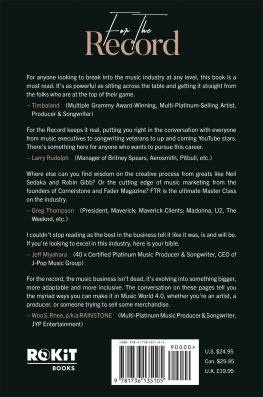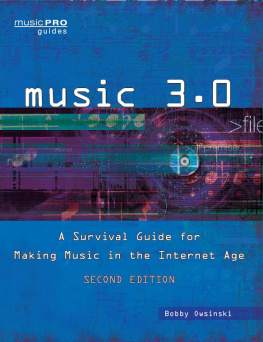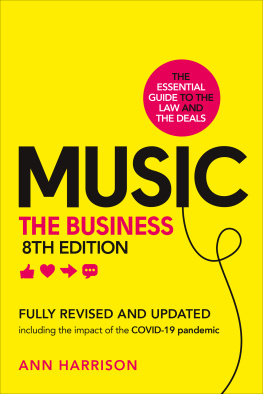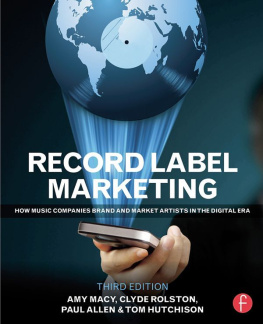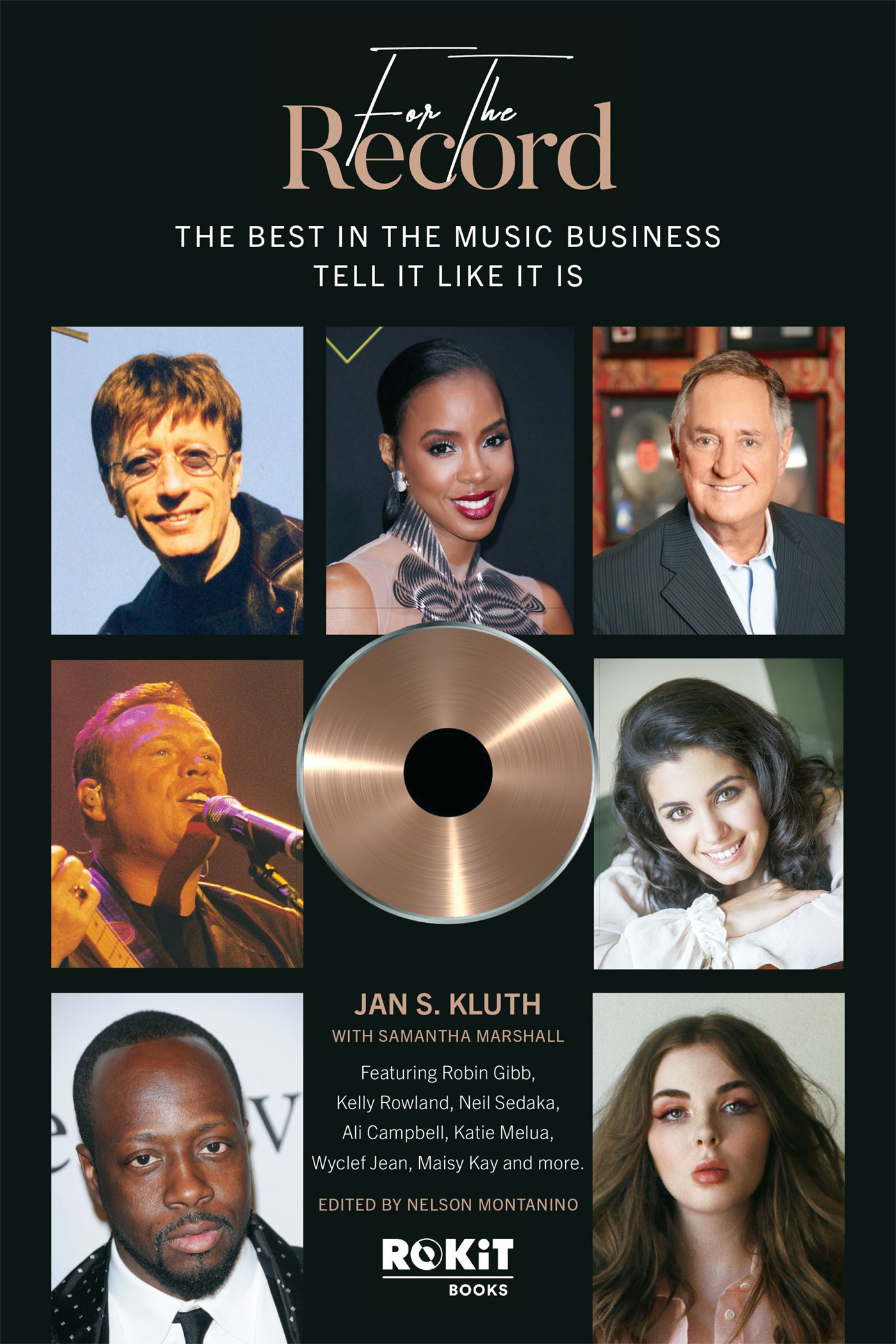FOR THE RECORD
Copyright 2020 by Jan S. Kluth
All rights reserved
For information about permission to reproduce
selections from this book, please write to:
ROKiT Books, Inc.
17383 Sunset Blvd, Suite #A300
Pacific Palisades CA 90272 USA
or
For information about special discounts
for bulk purchases, please contact
or +1 (424) 672-2922
Manufacturing by Star Print Brokers
Printed in South Korea
Book design by Nancy Starkman
Cover design by kaysha4design
Library of Congress Cataloging-in-Publication
Data is available.
ISBN: 978-1-7361351-0-5 (hardcover)
ISBN: 978-1-7361351-1-2 (epub)
www.rokitbooks.com
www.jankluth.com
1 2 3 4 5 6 7 8 9 0
TITLE PAGE PHOTOGRAPHS
TOP ROW LEFT TO RIGHT:
Robin Gibb
Editorial credit: Mark Anstead, Shutterstock
Kelly Rowland
Editorial credit: Matt Baron, Shutterstock
Neil Sedaka
Editorial credit: Neil Sedaka
MIDDLE ROW:
Ali Campbell of UB40
Editorial credit: Ken McKay, Shutterstock
Katie Melua
Editorial credit: Shutterstock
BOTTOM ROW:
Wyclef Jean
Editorial credit: Jim Smeal, BEI, Shutterstock
Maisy Kay
Editorial credit: Maisy Kay
DEDICATION
For my best friend and beautiful wife, Grace, my son, Jace, and my parents, Ingrid and Wolfgang, without whose love, patience and support this book would not have been possible.

ABOUT THE AUTHOR
Jan Kluth
Global Chief Commercial Ocer & Chief Strategy Ocer ROKiT Group of Companies
A n accomplished entrepreneur, C-suite executive, multi-faceted consultant, advisor and dealmaker, author Jan Kluth possesses unique experience, success and insight into the intersection of music, entertainment, media, technology and consumer goods in the Americas, Europe and Asia.
He conceived, initiated and was conduit for a $100+ million deal between a unit of a European media conglomerate and a U.S. multi-channel network and talent management company.
As JV partner and head of business development, Jan was instrumental in the domestic and international expansion and subsequent sale of a U.S. music / marketing / merchandise / e-commerce / ticketing start-up whose clients included Beyonc, The Rolling Stones and Miley Cyrus, for an amount in the upper seven figures.
As the first non-Asian senior executive for a leading Asian music and entertainment company, Jan was at the forefront of the continuing globalization of the K-Pop movement and successfully conceptualized and/or executed projects with pan-Asian superstars, such as the Wonder Girls, 2PM and Rainthe three-time winner of the TIME Magazine 100 poll in which readers were asked to rank who they think are the worlds most influential people.
He was also an integral part of building the branded entertainment unit for a leading European media conglomerate before becoming a partner in an award-winning content marketing company where he conceptualized, initiated, negotiated and / or executed numerous successful projects with clients such as Samsung, Toyota and Bacardi.
Educated in Germany, USA, UK and Spain, Jan holds three business degrees from colleges and universities in the UK and Germany and is fluent in four languages.
Jans two-decade long international experience in the most important areas of the music business (touring / live, brand partnerships, merchandise, publishing, recorded music) has given him an in-depth understanding of and perspective on the global music industry. As both an observer and participant of the business and culture of this art form, and having cultivated deep ties with leaders across genres, he is uniquely tuned in to tell its story: past, present and future.
Photo: Jan Kluth
Editorial credit: Jan Kluth

FOREWORD
By Roger H. Brown
President
Berklee College of Music
M usic is an immersive experience that potentially reaches all the senses. Its the bond that we share as a culturethe soundtrack of our experiences, both private and public. Hearing a song can evoke an emotion, trigger a memory or simply make us want to tap our foot and sing along. But its the business of music that governs what and how we listen, setting the bar and stoking the trends. It gauges what the public might like, then decides. It's that aspect of the industry that has changed dramaticallymore than anyone could have imagined.
Since 2004, when I first assumed the presidency of Berkleethe countrys leading music schoolthe ways in which music is developed, marketed and distributed has undergone seismic change. My tenure here coincided with the beginning of the file sharing or Napster era, when CD sales fell off a cliff. Practically overnight, the traditional way labels made money was undermined. Other legs of the stool like performance and touring grew, but the core was decimated.
The economics of the industry were devastating, especially for a record label that had built a system designed to do a certain thing that became antiquated and ultimately unprofitable. The irony of all this was that, because music became essentially free, its consumption skyrocketed. Then the rise of the instant star through shows and movies such as American Idol, Glee, Nashville, Pitch Perfect and The Voice opened up new possibilities for talent to be discovered and, consequently, how they are promoted. Younger people didnt just want to listen to music, they wanted to make music.
This, in turn, has upended the way artists are developed. Instead of grooming an act for months or years, theyre sent into hyper mode and packaged as a slick product in a matter of weeks. Rather than a label finding bands that are filling the clubs and getting them into the studio to record an album, they need to get traction on YouTube and build a fan base. The rules of the game have changed and continue to do so.
As our industry continues to evolve, Berklees curriculum strives to get out in front of these trends, leveraging them into opportunities for our students. Berklee has a unique history. It was founded in jazz, whereas other prestigious
Photo: Roger H. Brown
Editorial credit: Mike Spencer
music schools such as Juilliard concentrated mainly on classical music. I believe were still the best school for jazz training, but weve expanded to other fields that will allow musicians to sustain careers ranging from musician in a rock band to producer, marketer, composer, arranger and sound engineer. Some of our students even earn six figures giving private lessons.
Today, our graduates can make a more than respectable living writing soundtracks for audio books, original music for film and television, commercial jingles, even video game music. They work for Apple and iTunes. Even Facebook has hired a cadre of sound designers. And lets not forget musical theater. The director of the Broadway smash Hamilton was a Berklee alumni, as was Ramin Djawadi, who wrote the Game of Thrones theme song. Rihannas voice coach went to Berklee. No, the route to success is no longer based on label deals and album sales. But there are so many more paths open to those who love, perform and create music. Its all over the map, and thats the beauty of the modern music industry. You can even study music therapy and hone your craft in a nursing home, hospital or clinic.

